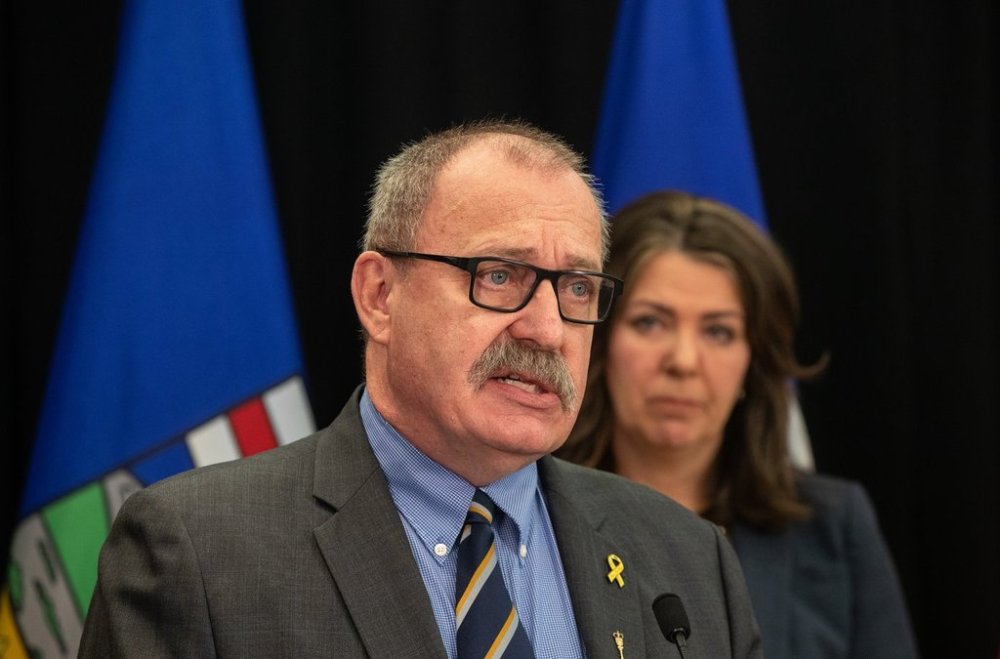Nine of Alberta Premier Smith’s UCP legislature members facing recall petitions
Advertisement
Read this article for free:
or
Already have an account? Log in here »
To continue reading, please subscribe:
Monthly Digital Subscription
$0 for the first 4 weeks*
- Enjoy unlimited reading on winnipegfreepress.com
- Read the E-Edition, our digital replica newspaper
- Access News Break, our award-winning app
- Play interactive puzzles
*No charge for 4 weeks then price increases to the regular rate of $19.00 plus GST every four weeks. Offer available to new and qualified returning subscribers only. Cancel any time.
Monthly Digital Subscription
$4.75/week*
- Enjoy unlimited reading on winnipegfreepress.com
- Read the E-Edition, our digital replica newspaper
- Access News Break, our award-winning app
- Play interactive puzzles
*Billed as $19 plus GST every four weeks. Cancel any time.
To continue reading, please subscribe:
Add Free Press access to your Brandon Sun subscription for only an additional
$1 for the first 4 weeks*
*Your next subscription payment will increase by $1.00 and you will be charged $16.99 plus GST for four weeks. After four weeks, your payment will increase to $23.99 plus GST every four weeks.
Read unlimited articles for free today:
or
Already have an account? Log in here »
EDMONTON – Nine members of Premier Danielle Smith’s United Conservative Party caucus are now facing recall petitions – enough to potentially tip the balance of power in the legislature.
Elections Alberta confirmed Monday that signature collection efforts can begin for six more UCP members, including cabinet ministers Rajan Sawhney, Myles McDougall, Dale Nally and R.J. Sigurdson.
Petitions were also issued for Ric McIver, Speaker of the house, and Muhammad Yaseen, associate minister for multiculturalism.

The approvals follow petitions recently approved for Education Minister Demetrios Nicolaides, backbencher Nolan Dyck and deputy Speaker Angela Pitt.
Nicolaides has been accused of failing to support public education while those behind petitions for Dyck and Pitt have complained about their ability to respond to concerns and address community issues.
The nine politicians represent constituencies across the province, ranging from Grande Prairie in the north to Highwood in the south. Five represent the Calgary area.
While the reasons vary, many of the newly approved petitioners said they’re upset the government used the Charter’s notwithstanding clause last month to end a provincewide teachers strike.
Melissa Craig, a teacher in Calgary petitioning for the removal of Sawhney, the Indigenous relations minister, said the government’s move left her feeling defeated, but it also inspired her to take action.
“I couldn’t just let it be that,” said Craig in an interview. “I couldn’t just stop there and not take action and change the narrative.”
Another common reason among applicants was that the MLAs are not responsive to community concerns or are not engaging with their constituents.
“Despite repeated outreach from community members, Yaseen has remained unresponsive and disengaged,” wrote Siobhan Cooksley in her recall application to Elections Alberta.
“His actions demonstrate a lack of accountability and commitment to the people he was elected to serve.”
Smith and her UCP caucus have argued that petitioners aren’t using the recall system appropriately, describing the concerns raised as disagreements over government policy rather than accusations of serious wrongdoing.
Sigurdson, who serves as agriculture minister, repeated that argument when speaking with reporters Monday. “They are weaponizing it because they don’t like the policy that was put forward by the government,” he said.
“I don’t think that was ever what recall was intended for; it was meant for complete misconduct only.”
Nally, the minister of Service Alberta, said in a statement to the chief electoral officer in response to his petition that he believes the constituent looking to remove him “acts as a proxy” for an activist group pushing for an early election call. Nally also cited voting records that he said show the petitioner didn’t vote in the 2023 general election.
“The question then becomes how does someone who does not even vote get talked into leading a recall?” Nally wrote.
In an interview, Nally’s petitioner, Joshua Eberhart, disputed the voting claim and questioned how the minister managed to obtain that information. Eberhart also pointed out that whether or not he voted doesn’t make him ineligible to lead a recall campaign.
He also disputed the allegation that he’s acting as a proxy for an organized group looking to topple the government.
“I’m just me,” Eberhart said.
“As a taxpayer, two of the things that I value most are education and health care, and I think they’re being mismanaged a little bit by our current government, which includes my local representative.”
When asked by reporters Monday to clarify his statement, Nally said he wouldn’t “comment on any specifics.”
The petition process allows those behind each campaign to collect signatures in their constituency over three months and, if they collect enough, a vote is held on whether the MLA keeps their seat.
It’s a long, multi-stage process. But if all nine MLAs are defeated in constituency votes, Smith’s government would lose its majority status.
The UCP has 47 members in the 87-member house. The Opposition NDP has 38, and two former United Conservatives sit as Independents after being removed from the governing caucus earlier this year.
The premier has said she’s talking to caucus members and other officials about making changes to the Recall Act.
Smith told reporters last week she’s concerned the grassroots spirit of the law is being abused, perhaps through online fundraising and even foreign interference. The act was brought in under former UCP premier Jason Kenney.
This report by The Canadian Press was first published Nov. 24, 2025.

